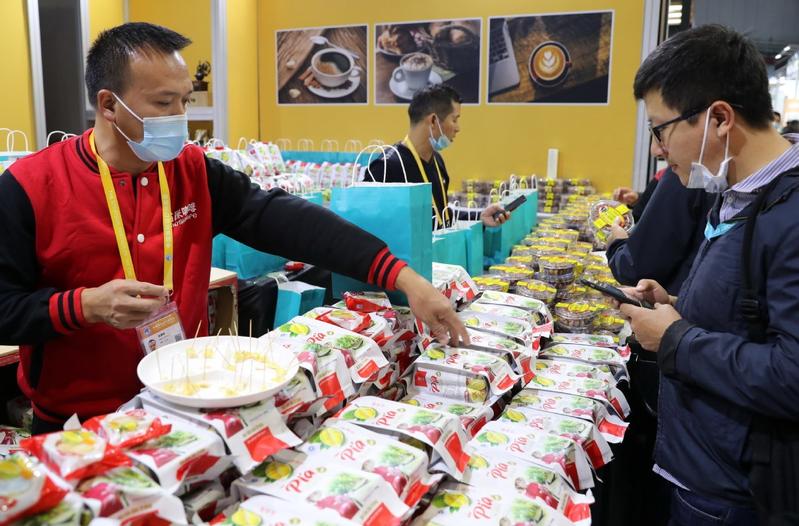 A visitor looks at Vietnamese food products at the third CIIE in Shanghai. (WANG ZHUANGFEI / CHINA DAILY)
A visitor looks at Vietnamese food products at the third CIIE in Shanghai. (WANG ZHUANGFEI / CHINA DAILY)
For South African business owner Graham Robson, the third China International Import Expo in Shanghai has been a window of bountiful opportunities.
Robson, a cross-border trader, came to the CIIE to find buyers for 8 metric tons of honey produced from the flowers of an indigenous tree, Julbernardia, in Miombo Forest in northwestern Zambia. Local people put beehives around the entire village as an eco-friendly way to keep out elephants, he said.
"We planned to sell the 8 tons of honey over a period of six months. Now we are already talking about opportunities to sell 100 tons," he said during a matchmaking session of the expo, which seeks to pair Chinese buyers with foreign traders.
Robson has already inked an agreement with a distributor in Tianjin and plans to sign deals with three more from Shanghai and Xi'an in Shaanxi province. "We hope to have at least 20 (distributors).Our sales potential has risen manifold due to the CIIE." Besides the wholesale agreements, Robson is also looking to grow individual sales through his own brand Elebee.
Though shipments were disrupted by the COVID-19 pandemic somewhat this year, food and agricultural products worth US$124.4 billion were imported by China during the first nine months of this year, up 13.3 percent on a yearly basis, said Ren Hongbin, assistant minister of commerce on Saturday
ALSO READ: Foreign firms see CIIE as increasingly vital platform
"I had heard that Chinese consumers are enthusiastic about imported foods. The huge potential helped me realize that there is a huge market for environment-friendly, healthy products in the country," he said.
Robson is just one of the hundreds of foreign traders at the expo looking to carve a niche in the growing market for imported foods in China, especially for products that are exotic, healthy and green.
China has been the world's second-largest food importer since 2012 and shipments have risen from US$11.4 billion to US$149.9 billion by 2019.
Though shipments were disrupted by the COVID-19 pandemic somewhat this year, food and agricultural products worth US$124.4 billion were imported by China during the first nine months of this year, up 13.3 percent on a yearly basis, said Ren Hongbin, assistant minister of commerce on Saturday.
"By controlling the outbreak, China has effectively stabilized the global food supply chain, and contributed to the economic recovery of agricultural product exporting countries," Ren said. "The food imports have also satisfied the growing demand for domestic consumption upgrade."
In 2019, China imported food products from 189 countries, said a report published by the China Chamber of Commerce for Import and Export of Foodstuffs, Native Produce and Animal By-products during the expo.
The food exhibition has been the most popular section of the CIIE. More than 1,000 food companies from nearly 100 countries and regions have set up booths during this year's expo, showcasing various products ranging from dairy, meat and fruits to snacks, liquor, and condiments. Spread over three halls in a gigantic expo venue, it also has an ample choice of wines from Europe, the Americas and Oceania.
Gerard Bertrand, a renowned winemaker from the Languedoc-Roussillon region in France and an expo participant last year, is part of the 200-square-meter Taste France pavilion, along with a dozen other French food companies.
Buoyed by the huge market potential in China, the company decided to open an office in the country in February to promote brand awareness and showcase the southern France lifestyle.
"It's a very specific way of living where people enjoy life and take care of the environment," said Oscar Nagore, general manager of its China branch. The company sells roughly 150,000 bottles of wine every year in China. "Our plan is to grow this by several times," he said.
"We had a successful CIIE debut last year and we want to continue the momentum. It's about time to put more focus and effort into the Chinese market, because you cannot have such a great market and not really take care of it," said Nagore.
According to the CIIE Bureau, more than 400,000 professional visitors have registered for the expo, and around 70 percent of the leading companies in the respective sectors were repeat exhibitors.
Osborne, a 248-year-old Spanish food group, is among the companies that have returned this year. "We appreciate the opportunity to reach out to a large number of people from all over the country," said Jose Iniguez, general manager of its China branch.
Iniguez added that the expo allows the company to promote its products to a wide cross-section of people, especially those from outside Shanghai.
READ MORE: Global pharma firms take CIIE pill for growth
The group established its China branch in Shanghai five years ago and its premium Iberian ham 5J Cinco Jotas is a top-seller at several Michelin restaurants in the city.
Although consumers who appreciate fine dining are concentrated in the first-tier cities, Iniguez sees huge potential in the second-and third-tier cities as more Chinese people have traveled abroad and are open to eating high-quality foreign foods.
"China on many levels has surpassed other countries in terms of technology and production. However, food products are difficult to source due to the different agricultural land and climatic conditions. The imported food market in China offers the biggest potential possible for any company in the world," he said.
"In addition, Chinese consumers are really keen to try high-quality products, which makes it even more attractive for us, not only because of the size but also due to the way people think about food."


